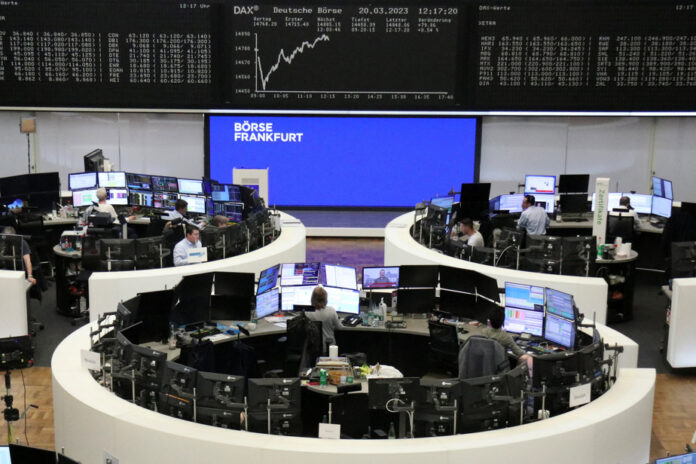(Paris) The emergency measures taken to allay fears over Credit Suisse and the strain on the banking system allowed stock markets to rebound on Monday, a movement that even included some banks.
After opening in the red, the European indices ended up sharply in Paris (1.27%), London (0.93%), Milan (1.59%) and Frankfurt (1.12%). The European banking sector, down sharply at the start of the session, finally rose (1.27%).
Wall Street was also up, 0.97% for the Dow Jones, 0.67% for the S
Among the biggest increases in Europe, the Swiss banking giant UBS finally gained 1.26%, after its takeover of Credit Suisse on Sunday for just over three billion euros. UBS shares had lost up to 15% of their value in the first hour of trading.
After market close, the rating agency S
The rating of Credit Suisse’s risky debt securities, known as “Additional Tier 1”, was also lowered from B and B to C, which means that S
Credit Suisse shares tumbled 55.74%, a predictable drop as it brings the troubled bank’s stock down to 0.82 Swiss francs, a price close to its takeover price. Five years ago, the stock traded around 15 euros.
“We are in a situation of crisis of confidence. This is where a central bank plays a major role “to ensure the stability of the banking system, in particular via “liquidity injections”, explained to AFP Catherine Hugel, manager at Hugau Gestion.
The Swiss central bank participated with the Swiss government in taking out guarantees to convince UBS to buy out its former rival. Across Europe, financial authorities multiplied statements on Monday to reassure investors about the solidity of the European banking system.
European Central Bank (ECB) President Christine Lagarde said banks in the eurozone had financial cushions “well above requirements” and that their exposure to canceled Credit Suisse debt securities was “very limited”.
The banks are not yet out of the woods, however, as losses in the Eurostoxx 600 banking index exceeded 13% last week. Several large establishments ended down again on Monday.
The crisis of confidence also persists with regard to the First Republic bank in the United States, the most heckled last week. It plunged 39.30% in session on Wall Street and more than 88% since March 1, dragging down other American regional banks, such as Western Alliance (-2.05%).
On the other hand, the shares of the major American banking establishments rose.
For ten days and the flash bankruptcy of the American institution Silicon Valley Bank (SVB), central banks have been forced to put in place numerous instruments to try to restore calm to the markets.
Tuesday begins the meeting of the monetary policy committee of the American central bank (Fed), which will have to make its decision the next day on whether or not to raise its interest rates.
The renewed concern at the start of the session, which was reflected in the rise in gold and the fall in bond yields, has also dissipated in the markets.
After crossing the symbolic threshold of 2000 dollars per ounce for the first time in a year, gold fell back to 1984 dollars per ounce (-0.28%).
On the government bond market, rates stabilized in Europe and rose in the United States.
The euro gained 0.52% against the dollar, to 1.0725 to the dollar, around 3 p.m. EST.
In the oil market, the two major barrels were up around 0.85%.















